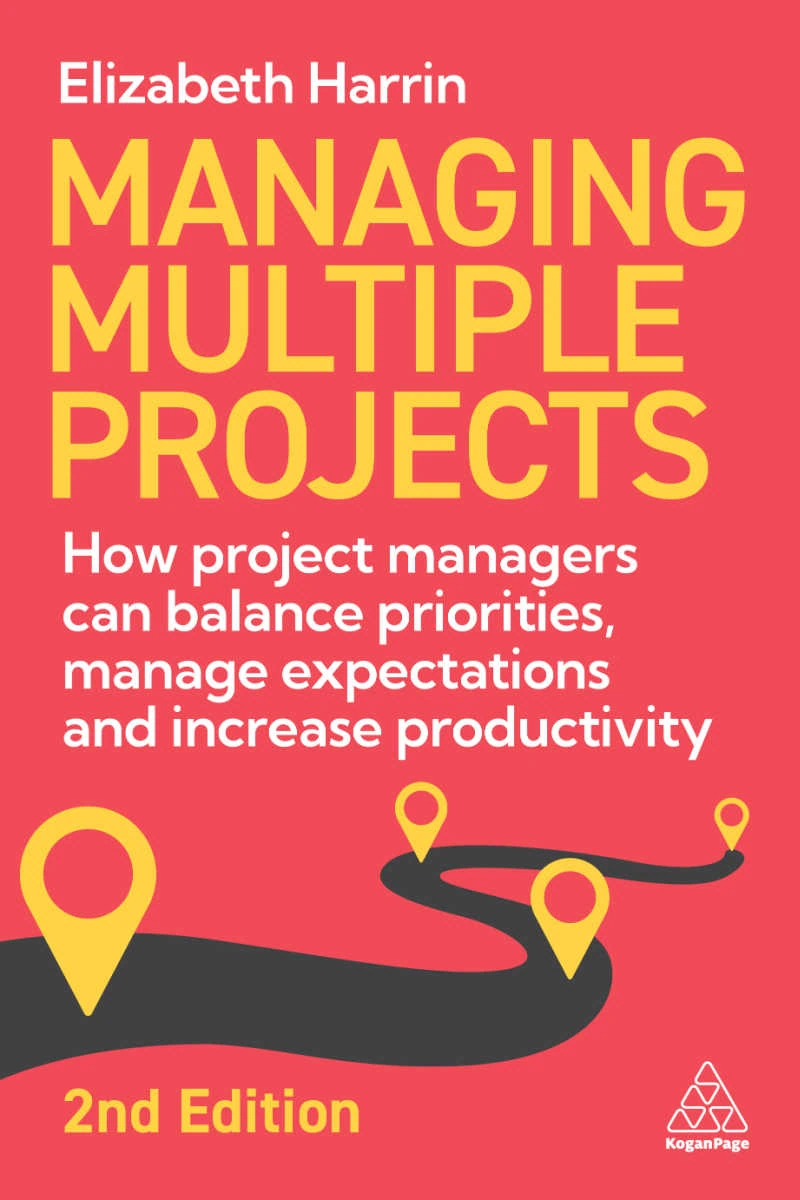3 Myths About Managing Multiple Projects That Are Blocking Your Promotion
This blog is reader-supported. When you purchase something through an affiliate link on this site, I may earn some coffee money. Thanks! Learn more.
Watch my free webinar training on the 3 critical skills you need to manage multiple projects. Learn the skills you really need to juggle all your work!
Managers promote people who are a safe pair of hands, who know how to get the job done and can work efficiently at all levels of the organization.
Being able to manage multiple projects is one way to evidence that you can do all of that.
Here are 3 myths you might be telling yourself about what it’s like to manage multiple projects: myths that might be stopping you from taking the next leap in your career and showing your boss you can do it.
Myth: The books will show you what to do
You’ve got a bunch of project management books on your shelf. You’ve done a course. You’ve got this project management thing all figured out – maybe you’ve even got a certification to prove that you can do it.
Truth: Certification won’t give you the skills to juggle multiple projects
The truth is that ALL the books I regularly recommend (and yes, even the ones I have written) tend to look at managing projects as a one-off thing.
- You start a project.
- You work on it with your team.
- You finish it.
But back in the real world, people are juggling more than one project. We work in businesses and organizations where we don’t have the luxury of being able to manage a single project at a time.

Partly that’s because most average projects are small enough not to need someone working on them full-time.
The other part of the reason is that businesses are delivering more change and people with good project management skills are in short supply. There is simply too much that organizations want to get done and not enough PMs to go round, so we all end up managing multiple projects simultaneously.
The certification prep books will show you how to pass the exam, but not how to adapt your ‘official’ skills into a way that streamlines the effort of managing several things at once, so you remove duplication and stop annoying stakeholders with multiple requests of their time.
Tip: Get the skills to manage multiple projects so you can truly tackle all the things on your To Do list in the most efficient way.
Get your copy
Managing Multiple Projects: How Project Managers Can Balance Priorities, Manage Expectations and Increase Productivity is a book that offers a comprehensive framework for juggling your workload and still leaving the office on time.

Myth: Your manager knows what you are working on
You do regular reporting, and maybe even time sheets. Your manager knows what you are doing every day and how much work you have.
Truth: They set work but haven’t really got capacity to track what you are doing day to day.
Your manager gives you stuff to do, but in my experience, they only have a very high-level overview of what you are working on from day-to-day. I learned this the hard way.
I called my manager late at night after a particularly difficult conversation with a project sponsor. I burst into tears and couldn’t hold my voice steady so I had to call her back.
The problem was this: my sponsor had asked me to do something that was virtually impossible and also (in my opinion) a waste of my time. It was an admin task: copying handwritten lists of who had attended a training course into another format so they could be kept electronically.
I couldn’t get that done and do everything else, and I was already working until late at night from a hotel. I came up with another plan: if it had to be done, get a temp admin assistant to do it. Although that came with the overhead of recruiting and hiring someone to sit and transcribe the list.
Still, if he felt this work was valuable, then paying for it was going to be OK.
I explained all this to my manager and she said: “He probably doesn’t know what else you are doing, so he thinks it’s OK.”
It was like a lightbulb going off in my head. He literally has no idea of how I am spending my time, and certainly isn’t aware I’m on the phone crying to my boss at 10pm at night because of the need to type up lists of names.
I also thought: How can he not know? I speak to him every day. He knows we are busting a gut to get this project delivered. What does he think we’re doing?
But the truth is: he probably wasn’t thinking about me (or anyone else in the team) that much at all.
We’re all senior managers. We should be able to manage our time and escalate, and have adult conversations about workload. Why wasn’t I doing that?
Because I was burning out with trying to please everyone and hold this project together… but that was on me.
My sponsor had his own difficulties, his own stakeholders to keep on side. He was also working long hours in a complex environment, where requirements were changing regularly as new information became available.
He had enough in his brain without wondering whether I had time to type up some lists.
So: lesson learned. Don’t assume your boss or your project sponsor know how you are spending your time. They heap on the work because they don’t have complete visibility, however much you try to provide that. The only one who knows how long your workload is taking is you.
I’m sure this is why we sometimes get given extra projects and the expectation that we can get them done.
Tip: Transparent reporting helps. Weekly reporting on fast-moving projects helps, and include the effort you are making as PM. For too long I reported on what the team was doing without including my effort. Find ways to tell people what you are doing.
Myth: Working longer hours is the only way to survive
When you get given more projects to run, the only way to get the work done is to spend more time at work.
Truth: There are strategies to help you structure your work and still get home on time.
There are synergies (I hate that word) that you can deploy to speed up managing more than one project. You can batch work, merge meetings, and structure your time.
In other words, if it takes 10 hours a week to manage one project, it doesn’t necessarily take 20 hours a week to manage two. (That’s simplistic as each project is unique and is going to take a different amount of time depending on lots of factors, but go with me on this.)
Working efficiently between several projects is the best way to get the work done and get home on time.
Caveat: Sometimes people truly do give you more work than you can humanly do, and in those situations you need to push back.
Tip: Blend processes together and find ways to streamline the effort. Use the right strategies to structure your work and manage your time, so you can take advantage of the synergies between projects and processes.
Learn how to manage multiple projects. Watch my free training on the 3 skills you really need to know to learn how to juggle your workload effectively and get all your projects done (yes, even the low priority ones).
